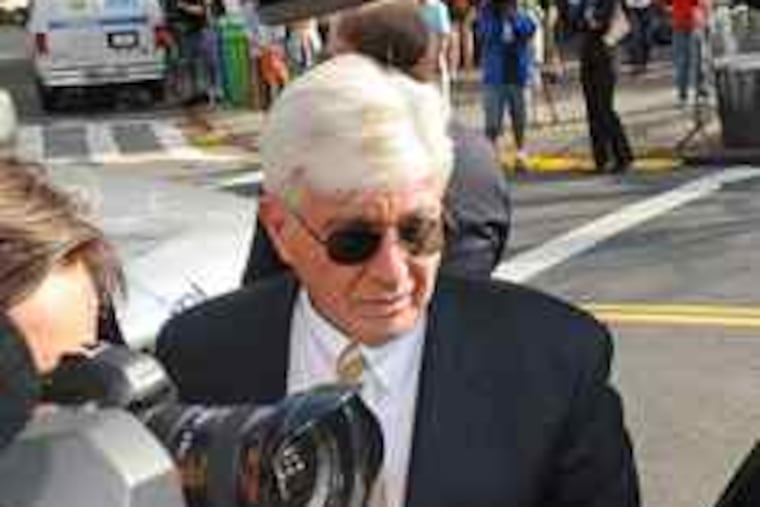Madoff gets maximum: 150 years
His penalty for a swindle estimated at $65 billion dwarfed those in Enron and WorldCom cases.

Bernard Madoff was sentenced yesterday to 150 years in federal prison for masterminding a massive Ponzi scheme, a penalty six times longer than those meted out to the chief executives of WorldCom Inc. and Enron Corp.
Madoff appeared yesterday before U.S. District Judge Denny Chin in New York for the first time since his March 12 guilty plea in an epic swindle that may have reached $65 billion in both real and phantom investments.
"I don't ask for any forgiveness," Madoff, 71, a former Nasdaq chairman, said as he stood before the judge. The money manager said he had deceived his brothers, his two sons, and his wife, none of whom was in the courtroom. The audience burst into applause as Chin imposed the maximum sentence. Madoff then was led off by U.S. marshals.
He sat still, looking down at his hands, as nine victims spoke, at times through tears and shaking anger, of their shattered lives.
Among them were a 33-year-old man with a disabled brother, a retired correctional officer scrounging for work, an elderly couple who could no longer afford a trip to see their newborn grandson, and a 65-year-old woman who described Dumpster-diving when her food stamps ran out at the end of the month.
The judge cited Madoff's failure to identify accomplices, which has made it harder for prosecutors to build cases against others. The receiver of his firm, Bernard L. Madoff Investment Securities L.L.C., also has said that Madoff has not substantially helped his work, complicating efforts to locate assets.
Madoff pleaded guilty to securities fraud, mail fraud, wire fraud, investment-adviser fraud, three counts of money laundering, false statements, perjury, false filings with the Securities and Exchange Commission, and theft from an employee-benefit plan.
One of the nine victims who spoke, Miriam Siegman of Stamford, Conn., said that Madoff "discarded me like roadkill," and that she now relied on food stamps, collecting recyclable cans and digging through Dumpsters.
Madoff apologized to his victims in his statement to the court, saying that he had "left a legacy of shame" and that he lived "in a tormented state." The financier said he had been unable to admit his error in judgment while the scheme grew and had thought he could "work his way out."
Defense lawyer Ira Sorkin told the court after the victims had spoken that his client was a "deeply flawed human being."
Madoff's wife, Ruth, said later yesterday in a statement that she was "devastated" by the fraud, as well as "embarrassed and ashamed." She will be left with $2.5 million under a settlement with federal prosecutors.
Trustee Irving Picard, responsible for unwinding Madoff's firm, said in a letter filed with the court yesterday that the former money manager had not provided "any meaningful cooperation" since his arrest.
Madoff's sentencing capped the downfall of an acclaimed investment adviser who had told the world his fortune came through an eponymous firm that specialized in making markets, trading securities, and advising wealthy clients.
Over three decades, he built a reputation as a brilliant stock picker who delivered steady returns through both bull and bear markets. He attracted an international client roster that included celebrities such as filmmaker Steven Spielberg, fund manager J. Ezra Merkin, charities, universities, friends, and even European royalty.
His facade shattered on Dec. 11, when he confessed to authorities that Bernard L. Madoff Investment Securities L.L.C. was "one big lie." Under immense pressure from a rush of investor redemptions, he admitted he had used money from new investors to pay old ones. Regulators later said his investment-advisory business hadn't made a trade in at least 13 years.
Some of his thousands of investors lost their life savings. Thierry Magon de La Villehuchet, chief executive officer of Access International Advisors, was driven to suicide because of his firm's Madoff-related losses, his brother, Bertrand Magon de la Villehuchet, said in January.
When he entered his guilty plea in March, Madoff said that in the early 1990s, with the United States in a recession, he felt "compelled" to provide the returns his investors expected and began stealing investor money. He said that the proprietary-trading and market-making units of his business, both run by his sons, were "legitimate," and that his British-based affiliate, Madoff Securities International Ltd., was an "honestly run" business.
Bernard Madoff
Age: 71.
Wife: Ruth.
Children: Andrew and Mark.
Education: B.A. in political science, Hofstra University, 1960.
Residences before arrest: New York City, Palm Beach, Fla., and Montauk, N.Y.
Crime and Punishment
How Madoff's prison sentence compares with those of other high-profile, white-collar criminals.
Madoff: 150 years.
Bernard Ebbers, WorldCom: 25 years.
L. Dennis Kozlowski, Tyco International: eight to 25 years.
John Rigas, Adelphia Communications: 12 years.
Jeffrey Skilling, Enron: 24 years.
SOURCES: Inquirer wire services, Hofstra University.
EndText